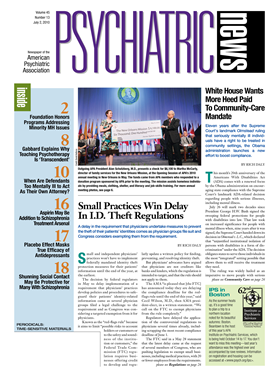The competence of criminal defendants to represent themselves in a trial, rather than have an attorney represent them, is separate from competence to stand trial. That was the ruling in the 2008 United States Supreme Court case, Edwards v. Indiana.
Thus competence to represent oneself could require a psychiatric evaluation separate from the evaluation of competence to stand trial.
But in a presentation about that case during a symposium at the APA annual meeting in May, psychiatry and law expert Debra Pinals, M.D., said that a problem relating to that decision is that the Court did not spell out precise criteria for determining competence to represent oneself at trial.
“The Court was willing to say that incompetence for self-representation required [the presence of] severe mental illness, but beyond that, [it] did not agree or put out any clear standard as to what the specific competence would entail,” Pinals said. “Justice Stephen Breyer [who wrote the majority opinion] stated that the judge at the trial-court level would be the one who would need to make the determination of competence for self-representation based, in a way, on fairness and dignity of the proceedings.”
Pinals is director of forensic psychiatry education and an associate professor in the law and psychiatry program at the University of Massachusetts Medical School. She is also assistant commissioner of forensic services for the Massachusetts Department of Mental Health.
In 1999, Ahmad Edwards tried to steal a pair of shoes from a department store. When approached by a security guard, he drew a shotgun and fired at the guard and wounded a bystander. One of the charges against him was attempted murder.
After three hearings to determine his competency to stand trial, Edwards was found at times to be incompetent and was sent to a hospital where he was restored to competence. Finally, six years after the original offense, he went to trial asking to represent himself. The judge in the case, citing Edwards' history of mental illness, denied the request and appointed counsel to represent him. Edwards was convicted on some of the charges.
Edwards appealed the denial of the request to represent himself to a state appeals court, and after yet another denial, to the Indiana Supreme Court and finally to the U.S. Supreme Court.
The U.S. Supreme Court held in its ruling in the Edwards case that states are not forbidden from appointing counsel to represent a defendant who is competent to stand trial but who suffers from mental illness that is severe enough to render him or her incompetent for self-representation.
Pinals said that this ruling from the Supreme Court establishes a new type of trial-related competence. Not fully known, however, is the extent to which psychiatrists and mental health professionals will be tapped to do assessments of a defendant's competence for self-representation. “And without a clear standard or guideline, it is difficult to know how to carry out these assessments,” she said.
“However, because the courts will need to look at the issue of whether a severe mental illness may compromise a defendant's ability to represent himself, it is likely that these assessments will require psychiatric or other mental health professional evaluation.
“Psychiatrists have been asked in some cases to assess defendants' competence to proceed [without an attorney], and have done so with little guidance as to what the standard should be to define this competence,” Pinals said. “We recognize that the competence would likely involve things other than the requirements for competence to stand trial, possibly including assessing defendants' understanding of law and legal proceedings [and] their ability to sustain attention, strategize, and plan a defense.”
She added that when a psychiatric evaluator is conducting a court-ordered evaluation of competence to stand trial, there is no automatic requirement to assess competence for self-representation as well. However, when defendants state in the context of an evaluation of competence to stand trial that they want to represent themselves, the evaluation might at that point include further exploration of the defendant's reasoning and could “provide the court with functional assessment data that a judge might consider in an analysis of competence to represent oneself,” Pinals said.


